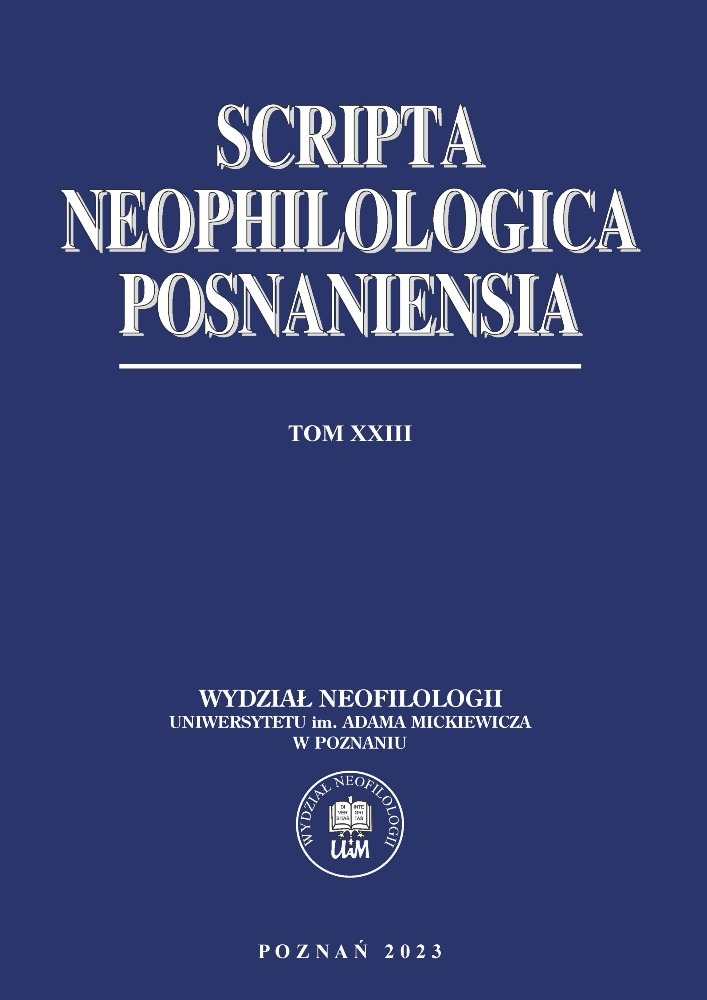Abstrakt
Kontekst wojny rosyjsko–ukraińskiej jawi się tutaj jako proces i jest ważnym przyczynkiem do dyskusji o technikach argumentacji, które uważa się za istotne i potencjalnie przełomowe z perspektywy radzenia sobie z zagrożeniem i konfliktem. W niniejszym artykule przedstawiono wyniki badania na gruncie pragma–dialektyki, a w szczególności wskaźników argumentacyjnych w orzekaniu sporu między Rosją, a Ukrainą. Autor uważa, że wyznaczają one procesy rozumienia oparte na osądzie i argumentacji, które dają solidne podstawy do ustalenia strategii radzenia sobie z wojną. Wybory językowe w postaci wskaźników argumentacyjnych stanowią punkty zwrotne w krytycznej dyskusji, pozwalając na rekonstrukcję i identyfikację dynamiki aktów mowy, które znajdują się we wzorcowej drodze argumentacji. Jak pokazuje niniejsza analiza, organizacja parametrów aktów zagrażających twarzy (FTAs) oraz proponowanych wskaźników utrzymujących stanowisko mówcy znacząco przyczynia się do sekwencyjności i komplementarności procesu argumentacji, który okazuje się wysoce skuteczny i rozsądny. Biorąc pod uwagę specyfikę orzekania jako gatunku, jego kontekstualizację sądowniczą oraz władzę ustawodawczą w procesowi orzekania, sugeruje się, że praktyka argumentacyjna stanowi strategię zarządzania zagrożeniami i ryzykiem.
Bibliografia
Adger, W.N. (2000). “Social and ecological resilience: are they related?”. Progress in Human Geography 24, 347–364. DOI: https://doi.org/10.1191/030913200701540465
Bar–Tal, D., A.W. Kruglanski, Y. Klar (1989). “Conflict termination: an epistemological analysis of international cases”. Political Psychology 10(2), 233–255. DOI: https://doi.org/10.2307/3791646
Bitzer, L. (1968). “The rhetorical situation”. Philosophy and Rhetoric 1, 1–14.
Budzynska, K., F.H. van Eemeren, M. Koszowy (2014). “Preface: from pragmatics and dialectics to argument studies”. Studies in Logic, Grammar, and Rhetoric 36(49), 7–22. DOI: https://doi.org/10.2478/slgr-2014-0014
Cap, P. (2013). Proximization. Amsterdam: John Benjamins. DOI: https://doi.org/10.1075/pbns.232
Chovanec, J. (2010). “Legitimation through differentiation: discursive construction of Jacques Le Worm Chirac as an opponent to military action”. In: U. Okulska, P. Cap. (ed.) Perspectives in politics and discourse. 61–82. Amsterdam: John Benjamins. DOI: https://doi.org/10.1075/dapsac.36.07cho
Chruszczewski, P.P. (2011). “Research directions in anthropological pragmatics”. Styles of Communication 3(1), 48–70.
Crawford, S.E., E. Ostrom (1995). “A grammar of institutions”. American Political Science Review 89(3), 582–600. DOI: https://doi.org/10.2307/2082975
Dynel, M. (2018). Irony, deception, and humour. Berlin: de Gruyter. DOI: https://doi.org/10.1515/9781501507922
Foley, W.A. (1997). Anthropological linguistics. Hoboken, New Jersey: Blackwell Publishing.
Fortuin, E. (2022). “Ukraine commits genocide on Russians: The term “genocide” in Russian propaganda”. Russ Linguist 46, 313–347. DOI: https://doi.org/10.1007/s11185-022-09258-5
Jackson, S. (1992). “Virtual standpoints and the pragmatics of conversational argument”. In: F.H. van Eemeren, R. Grootendorst, J.A. Blair, C.A. Willard. (eds.) Argumentation Illuminated. 260–69. Amsterdam: SicSat.
Fuller, L.L., K.I. Winston (1978). “The forms and limits of adjudication author”. Harvard Law Review 92, 353–409. DOI: https://doi.org/10.2307/1340368
Kursani, S. (2022). “Beyond Putin’s analogies: The genocide debate on Ukraine and the Balkan analogy worth noting”. Journal of Genocide Research 6, 1–13. DOI: https://doi.org/10.1080/14623528.2022.2099633
Lees, E., O.W. Pedersen (2020). Environmental adjudication. Oxford: Hart. DOI: https://doi.org/10.5040/9781509931491
Lucy, W. ([1999] 2004). Understanding and explaining adjudication. Oxford: Oxford University Press. Martin, J.R., P.R.R. White (2005). The language of evaluation. New York: Palgrave Macmillan. Morrill C., P.C. Facciola (1992). “The power of language in adjudication and mediation: institutio-nal contexts as predictors of social evaluation”. Law and Social Inquiry 17(2), 91–212. DOI: https://doi.org/10.1111/j.1747-4469.1992.tb00610.x
Norris, F.H., S.P. Stevens, B. Pfefferbaum, K.F. Wyche, R.L. Pfefferbaum (2008). “Community resilience as a metaphor, theory, set of capacities, and strategy for disaster readiness”. American Journal of Community Psychology 41(1–2), 127–50. DOI: https://doi.org/10.1007/s10464-007-9156-6
Pickavance, J. (2016). A practical guide to construction adjudication. United Kingdom: Wiley Blackwell. DOI: https://doi.org/10.1002/9781118717912
Schabas, A. (2022). “Genocide and Ukraine: Do words mean what we choose them to mean?”. Journal of International Criminal Justice 20(4), 843–857. DOI: https://doi.org/10.1093/jicj/mqac042
Searle, J. ([1969] 1970). Speech acts. An essay in the philosophy of language. Cambridge: Cambridge University Press. DOI: https://doi.org/10.1017/CBO9781139173438
Thompson, G., L. Alba–Juez (2014). Evaluation in context. Amsterdam: John Benjamins. DOI: https://doi.org/10.1075/pbns.242
Van Eemeren, F.H., R. Grootendorst (1984). Speech acts in argumentative discussions. A theoretical model for the analysis of discussions directed towards solving conflicts of opinion. Dordrecht: Foris & Berlin: de Gruyter. DOI: https://doi.org/10.1515/9783110846089
Van Eemeren, F.H., R. Grootendorst (2004). A systematic theory of argumentation. The pragmadialectical approach. Cambridge: Cambridge University Press. DOI: https://doi.org/10.1017/CBO9780511616389
Van Eemeren, F.H., P. Outclassed, A.F.S. Henkermans (eds.) (2007). Argumentative indicators. A pragma–dialectical study. The Netherlands: Springer. DOI: https://doi.org/10.1007/978-1-4020-6244-5
Van Eemeren, F.H. (2010). Strategic maneuvering in argumentative discourse. Amsterdam: John Benjamins. DOI: https://doi.org/10.1075/aic.2
Van Eemeren, F.H. (2019). “Argumentative style: a complex notion”. Argumentation 33, 153–171. Van Eemeren, F.H., B. Garssen (2008). Controversy and confrontation. Amsterdam: John Benjamins. DOI: https://doi.org/10.1007/s10503-019-09478-y
Van Eemeren, F.H., B. Garssen, S. Greco, T. van Haaften, N. Labrie, F. Leal, P. Wu (2022). Argumentative style. Amsterdam: John Benjamins. DOI: https://doi.org/10.1075/aic.20
Hinton, A. (2022). Putin’s claims that Ukraine is committing genocide are baseless, but not unprecedented. The Conversation, 25 February 2022, http://theconversation.com/putins–claims–that–ukraine–is–committing–genocide–are–baseless–but–not–unprecedented–177511, date of access: 3 July 2023.
Greenberg, J. (2022.) Fact check: Putin says Russians face‘genocide’in Ukraine. WRAL.Com, 28 February 2022,https://www.wral.com/fact–check–putin–says–russians–face–genocide–in–ukraine/20163715/, date of access: 3 July 2023.
Licencja
Prawa autorskie (c) 2023 Marta E. Strukowska

Utwór dostępny jest na licencji Creative Commons Uznanie autorstwa – Bez utworów zależnych 4.0 Międzynarodowe.

